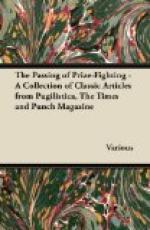* * * * *
The Experiments of Ganymede Bunn (HUTCHINSON) is like to command a wide audience. Its appeal will equally be to the lovers of Irish scenes, to those who affect stories about horses and hunting, and to the countless myriads who are fond of imagining what they would do with an unexpected legacy. It was this last that happened to Ganymede, who was left seventeen thousand pounds by an aunt called Juno (the names of this family are not the least demand that Miss Dorothea Conyers makes upon your credulity). My mention of horses and Ireland shows you what he does with his money, and where. It does not, however, indicate the result, which is a happy variant upon what is usual in such cases. You know already, I imagine, the special qualities to be looked for in a tale by Miss Conyers—chief among them a rather baffling inability to lie a straight course. If I may borrow a metaphor from her own favourite theme, she is for ever dashing off on some alluring cross-scent. More important, fortunately, than this is the enjoyment which she clearly has in writing her stories and passes briskly on to the reader. There’s a fine tang of the open-air about them, and a smell of saddle-leather, that many persons will consider well worth all the intricacies of your problem-novelists. I had the idea that her honest vulgar little legatee and his speculations as a horse-breeder might make a good subject for a character-comedian; but I suppose the late LORD GEORGE SANGER is the only man who could have produced the right equine cast.
* * * * *
The component elements of The White Rook (CHAPMAN AND HALL) may be summarised in the picturesque argot of Army Ordnance somewhat as follows: Chinamen, inscrutable, complete with mysterious drugs, one; wives, misunderstood, Mark I, one; husbands, unsympathetic (for purposes of assassination only), one; ingenues, Mark II, one; heroes, one; squires, brutal, one; murders of sorts, three; ditto, attempted, several. The inscrutable one is responsible for all the murders. Only the merest accident, it seems, prevents him from disposing of the few fortunate characters who survive to the concluding chapters of the story. He narrowly misses the misunderstood wife (now a widow, thanks to his kind offices), and his failure to bag the hero and ingenue (together with a handful of subsidiary characters) is only a matter of minutes. There is almost a false note about the last chapter, in which the Oriental commits suicide before he has completed his grisly task; but it was obviously impossible for anyone in the book to live happily ever after so long as he remained alive. Just how Mr. HARRIS BURLAND and the villainous figment of his lively imagination perform these deeds of dastard-do is not for me to reveal. The publishers modestly claim that in the school of WILKIE COLLINS this author has few rivals. As regards complexity of plot the claim is scarcely substantiated by the volume before me; but if bloodshed be the food of fiction Mr. BURLAND may slay on, secure in his pre-eminence.




